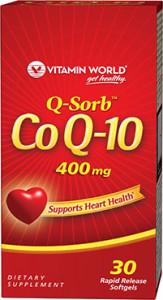 Coenzyme Q10 is also used in instances when individuals are suffering from congestive heart failure. In this condition the heart is unable to pump efficiently which slows the amount of blood to and from the lungs and the rest of the body. In order to temporarily maintain pumping power the heart can enlarge, it can beat faster or the ventricular walls can become thicker. Coenzyme Q10 allows the body to more effectively produce power and energy so that the heart can work more efficiently. (5)
Coenzyme Q10 is also used in instances when individuals are suffering from congestive heart failure. In this condition the heart is unable to pump efficiently which slows the amount of blood to and from the lungs and the rest of the body. In order to temporarily maintain pumping power the heart can enlarge, it can beat faster or the ventricular walls can become thicker. Coenzyme Q10 allows the body to more effectively produce power and energy so that the heart can work more efficiently. (5)
Early studies using Coenzyme Q10 with individuals who have Parkinson’s disease have been positive. Phase 2 studies out of the University of California, School of Medicine is working with 80 different Parkinson patients at 10 different centers across the United States to determine the efficacy, efficiency and safety of Coenzyme Q10. The theory is that it may slow down the rate of functional decline in individuals who are suffering from Parkinson’s disease. In previous studies, researchers found that individuals who suffered with Parkinson’s disease had reduced levels of Coenzyme Q10. Animal studies have found that this substance can protect the area of the brain that is damaged in Parkinson’s disease. (6)
Several new clinical studies involving small numbers of people have suggested that supplementation with Coenzyme Q10 may lower blood pressure. Research subjects found it took between four and 12 weeks before any beneficial effect was observed. Further research is also being done to evaluate the effectiveness of Coenzyme Q10 in individuals who suffer from Diabetes. In a recent study of individuals with Diabetes 200 mg two times a day were given to Diabetics who subsequently showed no hypoglycemic response. Coenzyme Q10 has been shown to affect a sudden and dramatic drop in blood sugar which can be dangerous to the Diabetic.
References:
(1) Basic Research in Cardiology: Coronary artery disease–free radical damage, antioxidant protection and the role of homocysteine
http://www.ncbi.nlm.nih.gov/pubmed/11192356
(2) Cardiovascular Research: The Role of Oxidants and Free Radical in Reperfusion Injury
http://cardiovascres.oxfordjournals.org/content/70/2/181.full
(3) American Family Physician: Coenzyme Q10
http://www.aafp.org/afp/2005/0915/p1065.html
(4) University of Maryland Medical Center: Coenzyme Q10
http://www.umm.edu/altmed/articles/coenzyme-q10-000295.htm
(5) Linus Pauling Institute: Coenzyme Q10
http://lpi.oregonstate.edu/infocenter/othernuts/coq10/
(6) University of California SanDiego: Preliminary Study Shows High-Dose Coenzyme Q10 Slows Functional Deline in Parkinson’s Disease Patients
http://ucsdnews.ucsd.edu/newsrel/health/101402Schults.htm
(7) University of Maryland Medical Center: Coenzyme Q10
http://www.umm.edu/altmed/articles/coenzyme-q10-000295.htm
| Advertisement | |
 |
|


Leave a Reply